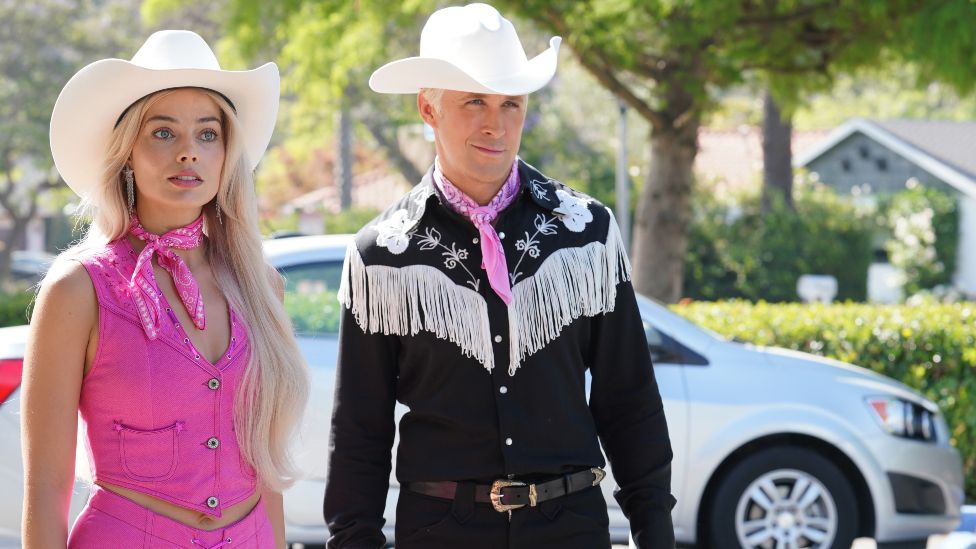Life in plastic is mostly fantastic according to many critics, who have broadly praised the Barbie movie.
The much-publicised film is released this Friday – opposite Christopher Nolan’s Oppenheimer – and stars Margot Robbie and Ryan Gosling.
Empire said Barbie was “painfully funny”, while the Independent described it as “joyous from minute to minute”.
But the Daily Mail called it “uneven and disjointed”, while Time said it was “very pretty but not very deep”.
Robbie stars as the doll in director Greta Gerwig’s film, which has been made with co-operation from toy manufacturer Mattel.
In a five-star review, the Independent’s Clarisse Loughrey said: “Barbie is one of the most inventive, immaculately crafted and surprising mainstream films in recent memory – a testament to what can be achieved within even the deepest bowels of capitalism.
“While it’s impossible for any studio film to be truly subversive, especially when consumer culture has caught on to the idea that self-awareness is good for business, Barbie gets away with far more than you’d think was possible.”
This video can not be played
To play this video you need to enable JavaScript in your browser.
The Telegraph’s Robbie Collin was also positive, awarding the film four stars and describing it as “deeply bizarre, conceptually slippery and often roar-out-loud hilarious”.
“It’s an unexpected pleasure to report that Greta Gerwig’s film – while still fundamentally being a summer comedy adventure about the Barbie toy line – is far from the blunt-force cash grab many of us feared,” he wrote.
“The satirical angle – likelier to strike a chord with older viewers than pre-teens – is enthusiastically and mischievously milked. (There are gags here that gleefully poke a number of masculine online beehives.)”
This video can not be played
To play this video you need to enable JavaScript in your browser.
However, the Daily Mail’s Sarah Vine was less keen on the representation of men. She wrote: “It’s a deeply anti-man movie, an extension of all that TikTok feminism that paints any form of masculinity – other than the most anodyne – as toxic and predatory…
“Every male character is either an idiot, a bigot or a sad, rather pathetic loser. If the roles were reversed, and a male director made a film about how all women were hysterical, neurotic, gold-digging witches, it would be denounced – quite rightly – as deeply offensive and sexist.”
She concluded: “It’s uneven, disjointed, the plot makes no real sense – and the dead hand of corporate America weighs heavily upon it.”

The Guardian’s Peter Bradshaw also gave a lukewarm review, awarding the film three stars.
He suggested Barbie is “a good-natured but self-conscious movie” that is “occasionally very funny, but sometimes also somehow demure and inhibited, as if the urge to be funny can only be mean and satirical”.
He added: “This movie is perhaps a giant two-hour commercial for a product, although no more so than The Lego Movie, yet Barbie doesn’t go for the comedy jugular anywhere near as gleefully as that.”
Other critics were far more positive. Rolling Stone’s David Fear said Barbie “may be the most subversive blockbuster of the 21st Century”, while NME’s Alex Flood noted the script “contains unexpected subtlety”.
Barbie received its UK premiere last Wednesday – one of the last major showbiz events to be held before the Hollywood actors’ strike was announced by industry union SAG.

Empire’s Beth Webb praised Robbie and Gosling’s performances as Barbie and Ken in her four-star review.
“Robbie – who has been dialling it up to 11 since Harley Quinn – is hilarious, but the most consistent scene-stealer is Mr. Blond Fragility,” she said.
“Gosling submerges wholeheartedly into Ken’s insecure psyche as he moves from Barbie’s sidepiece to patriarchal poster boy. Every muscle flex, every hair flick, every guitar strum lands perfectly. There are moments where he will rob you of breath.”
There was also praise for the film’s director from Devan Coggan of Entertainment Weekly, who said: “Never doubt Gerwig.
“The Oscar-nominated filmmaker has crafted a fierce, funny, and deeply feminist adventure that dares you to laugh and cry, even if you’re made of plastic.”
Lovia Gyarkye of the Hollywood Reporter struck a more dissenting note, writing: “However smartly done Gerwig’s Barbie is, an ominousness haunts the entire exercise.
“The director has successfully etched her signature into and drawn deeper themes out of a rigid framework, but the sacrifices to the story are clear. The muddied politics and flat emotional landing of Barbie are signs that the picture ultimately serves a brand.”

Other reviews had different criticisms, with Deadline’s Valerie Complex describing Barbie as “an imperfect film”.
“It stumbles somewhat in its handling of its characters of colour. They mostly are used as devices to push the Stereotypical Barbie and Ken narratives forward,” she said.
“There is a tight 95-minute movie here, but it’s crammed with pointless dance scenes and musical numbers that are just filler and nothing else.”
Johnny Oleksinski of the New York Post went further, describing Barbie as an “overwrought disappointment”.
“The packaging of Barbie is a lot more fun than the tedious toy inside the box,” he said. “To almost quote the Aqua song: Life in plastic – not fantastic.”
The tone of the film was criticised by Time’s Stephanie Zacharek, who said: “It’s a movie that’s enormously pleased with itself. Barbie never lets us forget how clever it’s being, every exhausting minute.”

Variety’s Peter DeBruge concluded: “It’s kind of perfect that Barbie is opening opposite Christopher Nolan’s Oppenheimer, since Gerwig’s girl-power blockbuster offers a neon-pink form of inception all its own, planting positive examples of female potential for future generations.
“Meanwhile, by showing a sense of humour about the brand’s past stumbles, it gives us permission to challenge what Barbie represents – not at all what you’d expect from a feature-length toy commercial.”
- BBC Culture review: Gerwig’s ‘bold, inventive’ Barbie breaks the mould
Related Topics
- Film
- Barbie
